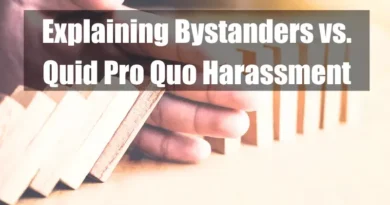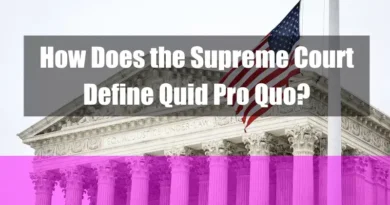Understanding Sexual Quid Pro Quo Harassment
Takeaways
| Key Points |
|---|
| Sexual quid pro quo harassment is a form of sexual harassment where an individual in a position of authority demands or suggests sexual favors in exchange for employment or academic benefits, creating a transactional dynamic that exploits the power imbalance between the harasser and the victim. |
| This coercive behavior is legally recognized as a violation under laws such as Title VII of the Civil Rights Act of 1964 and Title IX of the Education Amendments of 1972, which prohibit discrimination based on sex in employment and education settings. |
| Key characteristics include unwelcome sexual advances, conditioning of professional or academic outcomes on submission to such advances, and tangible consequences for refusal, such as demotion or termination. |
| Notably, even a single instance of such conduct is sufficient to establish a violation, distinguishing it from other forms of harassment that may require a pattern of behavior. |
| Landmark legal cases, such as Meritor Savings Bank v. Vinson (1986), have established that quid pro quo harassment, where employment benefits are conditioned on sexual favors, constitutes a violation of Title VII. |
Introduction to Sexual Quid Pro Quo Harassment
Definition of “Sexual Quid Pro Quo”
“Sexual quid pro quo” refers to a form of sexual harassment that occurs when an individual in a position of authority—such as a manager, supervisor, or professor—demands or suggests sexual favors in exchange for employment, academic benefits, or other advantages. The term “quid pro quo” translates from Latin to “this for that,” encapsulating the idea of an exchange where the harasser offers a job promotion, raise, or favorable treatment in return for sexual acts.
In contrast to other types of sexual harassment, quid pro quo harassment involves a clear transactional element. The harasser holds tangible power over the victim, directly linking career or academic benefits to the fulfillment of sexual demands.

Historical Context and Legal Recognition
Sexual quid pro quo harassment has long been recognized as a violation of civil rights, especially under laws such as Title VII of the Civil Rights Act of 1964 and Title IX of the Education Amendments of 1972. These laws paved the way for legal recognition of various forms of sexual harassment, holding institutions accountable for discriminatory practices in employment and education settings.
During the late 20th century, courts increasingly addressed quid pro quo sexual harassment, with landmark cases like Meritor Savings Bank v. Vinson (1986) and Burlington Industries v. Ellerth (1998) establishing clearer standards for defining harassment and the associated legal consequences for perpetrators.
Key Characteristics of Sexual Quid Pro Quo Harassment

Unwelcome Sexual Advances or Requests
At the core of quid pro quo harassment is the presence of unwanted sexual advances. These advances may be verbal, physical, or implied. What makes them particularly harmful is the coercive nature behind the request; the victim feels pressured to comply because their job or academic standing could be jeopardized if they refuse.
Conditioning Employment or Academic Outcomes Based on Sexual Conduct
A defining feature of quid pro quo harassment is the linkage of employment or academic outcomes to sexual favors. For example, a manager might hint that an employee’s promotion depends on their willingness to engage in sexual activities. This creates a toxic environment where the victim feels that their professional advancement is contingent on their submission to inappropriate behavior.
Authority and Power Imbalance
Quid pro quo harassment inherently involves an imbalance of power. The perpetrator is typically in a position of authority, such as a boss, teacher, or administrator. At the same time, the victim holds less power within the organization. This dynamic makes it difficult for the victim to refuse the demands, fearing retaliation or professional repercussions.
Tangible Employment or Academic Consequences
Unlike some other forms of harassment, quid pro quo cases often result in clear, adverse consequences for the victim. For instance, refusal to comply with the harasser’s demands may lead to demotion, loss of benefits, poor performance evaluations, or even termination. Such tangible consequences distinguish quid pro quo harassment from hostile work environment claims.
Single-Instance Harassment Suffices
One crucial element of quid pro quo harassment is that it does not require a pattern of behavior to be legally actionable. Even a single instance where an employee or student is pressured to engage in sexual conduct in exchange for benefits is enough to establish a violation.
Examples of Sexual Quid Pro Quo Harassment

Sexual Favor Demands in Exchange for Promotions or Perks
A common example of Quid pro quo harassment occurs when a supervisor suggests that an employee will be promoted only if they engage in sexual acts. This coercion can range from explicit demands to subtle hints that the employee’s advancement depends on complying with inappropriate requests.
Retaliation for Refusal (Demotion, Firing)
Retaliation commonly occurs if the victim refuses sexual advances in a quid pro quo situation. This may result in demotion, firing, or denial of raises or promotions. When a superior’s sexual demands are turned down, victims may face negative consequences, including exclusion from opportunities, as courts have seen in various cases. Title VII of the Civil Rights Act of 1964 prohibits this form of retaliation.
Real-World Cases and Legal Precedents
Meritor Savings Bank v. Vinson (1986) marked a pivotal moment in defining sexual harassment claims under Title VII. Mechelle Vinson alleged that her supervisor forced her into a sexual relationship, using her job security as leverage. The Supreme Court determined that quid pro quo harassment, where employment benefits are conditioned on sexual favors, constitutes a violation of Title VII. Additionally, the Court recognized that sexual harassment creating a hostile work environment, even without tangible economic loss, also violates Title VII by fostering discriminatory workplace conditions. Importantly, the Court ruled that even voluntary participation in such acts does not nullify a harassment claim if coercion is present, establishing a key precedent for future cases.
The 2017 case, Doe v. Mercy Catholic Medical Center, involved allegations of quid pro quo harassment under a Title IX framework, specifically in the context of a medical residency program. A medical resident accused the program director of conditioning her access to educational opportunities, such as favorable recommendations and training, on her compliance with his sexual advances. The Third Circuit ruled that the allegations, if proven, could constitute quid pro quo harassment, as they involved demands based on sex, leading to unequal treatment. The court further determined that the adverse consequences following her refusal to comply, including her dismissal from the program, could potentially violate Title IX, reinforcing protections against sex-based harassment in educational settings.
Legal Framework Protecting Against Sexual Quid Pro Quo Harassment
Title VII of the Civil Rights Act of 1964
Title VII prohibits discrimination in employment based on sex, including sexual harassment. Quid pro quo harassment clearly falls under this definition, as it involves the conditioning of employment decisions on sexual conduct. Employers guilty of such violations face serious legal repercussions, including compensatory damages, back pay, and other penalties.
Title IX in Educational Settings
Title IX serves as a parallel to Title VII in the educational context, protecting students from sex-based discrimination in federally funded schools. Quid pro quo harassment in schools, colleges, and universities often involves faculty or administrators using their position to solicit sexual favors in exchange for academic advantages. Institutions that fail to prevent or address such harassment risk losing federal funding and facing lawsuits.
State-Specific Laws and Their Variations
While Title VII and Title IX form the federal backbone of anti-harassment protections, many states have laws that extend these protections. For example, California’s Fair Employment and Housing Act (FEHA) offers broader protections than Title VII, lowering the threshold for proving harassment claims.
States like New York and Illinois have also introduced specific laws that address workplace sexual harassment, ensuring stricter penalties for offenders.

Reporting and Investigating Sexual Quid Pro Quo Harassment
How to Document and Report Harassment
When a victim experiences sexual quid pro quo harassment, documentation is crucial for building a strong case. Individuals should record all relevant incidents, noting the date, time, location, and any specific comments or actions made by the harasser. Keeping emails, text messages, and other forms of written communication that demonstrate harassment can further strengthen a claim. Witnesses to the events should also be listed, if available.
Once documented, the next step is reporting the harassment to the appropriate authorities. Victims typically begin by notifying their employer’s Human Resources (HR) department or designated harassment officer.
If the organization fails to act or the victim feels unsafe doing so, filing a claim with external agencies, like the Equal Employment Opportunity Commission (EEOC), becomes the next recourse.
Role of HR and Legal Authorities (EEOC Processes)
Human Resources plays a pivotal role in addressing harassment claims. After filing a complaint, HR must launch an internal investigation, interviewing the involved parties and reviewing any submitted evidence. A prompt and impartial investigation is required to maintain the integrity of the process and ensure fairness for all parties involved.
When internal investigations fail, or the victim feels that the employer is not addressing the issue adequately, a complaint can be filed with the EEOC. The EEOC will assess whether the claim falls under Title VII or Title IX protections and, if it does, will investigate the allegations.
If the EEOC finds merit in the claim, it can file a lawsuit on behalf of the victim, or it may issue a “right to sue” letter, allowing the individual to pursue legal action independently.
Rights of the Victim and Due Process
Victims of sexual quid pro quo harassment are entitled to a safe working or educational environment free from discrimination and retaliation. They have the right to be heard and to have their claims investigated thoroughly and impartially.
Due process also requires that the accused have a fair opportunity to respond to the allegations against them. Both parties are protected from retaliation during and after the investigation, with any adverse action taken against a victim constituting a separate legal violation.

Employer’s Role in Preventing Sexual Quid Pro Quo Harassment
Policies Employers Must Have in Place
To prevent sexual quid pro quo harassment, employers must implement clear anti-harassment policies. These policies should explicitly define what constitutes sexual harassment, including quid pro quo situations, and outline the steps employees can take if they experience or witness harassment. Effective policies should also clarify the consequences for perpetrators and provide information on how complaints will be investigated.
Policies must be readily accessible to all employees, either through handbooks, websites, or training sessions, and should encourage reporting without fear of retaliation.
Anti-Harassment Training Programs
Regular anti-harassment training is essential in creating a workplace free from discrimination. These programs educate employees on recognizing and reporting harassment, emphasize the company’s zero-tolerance stance, and demonstrate the procedures in place for addressing complaints.
Training should also teach supervisors about their responsibilities in preventing and addressing harassment, as they are often in a position of power where quid pro quo harassment occurs.
Legal Liabilities for Non-Action
Employers that fail to act on harassment claims or to prevent harassment may face significant legal consequences. Under Title VII, organizations are liable for the actions of supervisors if they fail to implement proper safeguards or respond appropriately to harassment complaints.
This liability can result in substantial compensatory and punitive damages for victims and reputational damage to the company. Employers are thus incentivized to take proactive steps to avoid being found legally negligent.

Consequences for Violating Sexual Quid Pro Quo Laws
Legal Penalties for Perpetrators
Individuals found guilty of sexual quid pro quo harassment may face a variety of legal penalties. In severe cases, this can include termination from their position, legal action by the victim, and civil or criminal penalties, depending on the circumstances. Legal actions often lead to significant financial consequences, including compensatory and punitive damages for the victim.
Perpetrators may also face personal and professional ramifications, including damage to their reputation, disqualification from future employment in similar roles, and potential criminal charges.
Compensatory and Punitive Damages for Victims
Victims of quid pro quo harassment are entitled to compensatory damages, which may cover lost wages, emotional distress, and any financial losses incurred due to the harassment. In cases where the employer or perpetrator’s conduct is deemed particularly egregious, punitive damages may also be awarded to punish the wrongdoing and deter future violations. Title VII allows victims to seek both types of damages in a civil lawsuit.
Long-Term Impact on Workplace Culture
Quid pro quo harassment can have a lasting negative effect on workplace culture. When such harassment goes unaddressed, it creates an environment of fear and mistrust, leading to decreased morale, lower productivity, and high turnover rates.
A workplace plagued by harassment may also struggle to attract and retain talent, ultimately harming its overall success. Properly addressing and preventing harassment is essential for maintaining a healthy, respectful, and efficient work environment.

Preventative Measures and Best Practices
Creating a Harassment-Free Workplace
A harassment-free workplace begins with a commitment from leadership to prioritize respect, equity, and safety. Employers must foster a culture where all employees understand that harassment, in any form, will not be tolerated. Clear communication, consistent enforcement of policies, and an open-door reporting process are key elements of a successful prevention strategy.
Building Awareness and Support Systems for Victims
Support systems for victims are essential in encouraging reporting and offering protection. These can include confidential counseling services, access to legal advice, and peer support groups. Employers should also designate specific staff members or departments to handle harassment complaints with sensitivity and confidentiality.
Whistleblower Protections and Retaliation Prevention
Organizations must implement robust whistleblower protections to ensure victims and witnesses feel safe coming forward. These protections guarantee that individuals who report harassment will not face retaliation, such as demotion, dismissal, or other adverse consequences. Enforcing strict anti-retaliation policies is essential for maintaining trust in the reporting system and encouraging transparency.
Conclusion
Sexual quid pro quo harassment remains a significant issue in workplaces and academic settings. Understanding the legal framework, the characteristics of this form of harassment, and the steps for reporting and prevention are critical for maintaining safe, respectful environments.
Employers are heavily responsible for preventing harassment through comprehensive policies, training programs, and prompt responses to complaints.
By fostering awareness and providing support systems for victims, institutions can help eliminate the damaging effects of quid pro quo harassment and promote a healthier, more inclusive culture.
FAQ
What is “quid pro quo” in the context of sexual harassment?
“Quid pro quo” is a Latin term meaning “something for something.” In sexual harassment law, it refers to situations where employment decisions—such as hiring, firing, promotions, or other job benefits—are conditioned upon the acceptance or rejection of unwelcome sexual advances.
How does “tangible employment action” relate to quid pro quo harassment?
A “tangible employment action” involves significant changes in employment status, such as hiring, firing, promotion, demotion, reassignment with significantly different responsibilities, or a decision causing a significant change in benefits. In quid pro quo harassment, such actions are contingent upon the acceptance or rejection of sexual advances.
What constitutes “unwelcome sexual conduct” in a quid pro quo harassment claim?
“Unwelcome sexual conduct” includes any sexual advances, requests for sexual favors, or other verbal or physical conduct of a sexual nature that the employee did not solicit or incite and that the employee regarded as undesirable or offensive.
What is the “respondeat superior” doctrine in the context of sexual harassment?
“Respondeat superior” is a legal doctrine holding employers vicariously liable for the actions of their employees when those actions occur within the scope of employment. In sexual harassment cases, if a supervisor commits quid pro quo harassment, the employer may be held liable under this doctrine.
How does a “hostile work environment” differ from quid pro quo harassment?
While both are forms of sexual harassment, a “hostile work environment” arises from unwelcome sexual conduct that is severe or pervasive enough to create an intimidating, hostile, or offensive work environment. In contrast, “quid pro quo” harassment involves direct exchanges of sexual favors for employment benefits.
What is the “affirmative defense” available to employers in quid pro quo harassment cases?
Employers may assert an affirmative defense by proving that they exercised reasonable care to prevent and promptly correct any sexually harassing behavior and that the employee unreasonably failed to take advantage of any preventive or corrective opportunities provided by the employer.
What does “constructive discharge” mean in the context of sexual harassment?
“Constructive discharge” occurs when an employee resigns due to intolerable working conditions, such as enduring quid pro quo sexual harassment. The resignation is considered a termination by the employer, making the employer liable for the harassment.
What is the “tangible employment action” standard in quid pro quo harassment claims?
The “tangible employment action” standard requires that the alleged harassment resulted in a significant change in employment status, such as hiring, firing, promotion, demotion, reassignment with significantly different responsibilities, or a decision causing a significant change in benefits.
How does “quid pro quo” relate to “sexual coercion” in legal terms?
“Sexual coercion” involves pressuring or forcing someone into sexual activity through threats or manipulation. In the workplace, “quid pro quo” harassment can be a form of sexual coercion when an employer demands sexual favors in exchange for job benefits.
What is the role of “agency law” in employer liability for quid pro quo harassment?
Under “agency law,” an employer can be held liable for the actions of an employee if the employee is acting within the scope of their employment. In quid pro quo harassment cases, if a supervisor commits harassment, the employer may be vicariously liable under this principle.
What does “prima facie case” mean in the context of sexual harassment claims?
A “prima facie case” refers to establishing sufficient evidence to support a legal claim. In sexual harassment cases, it means presenting enough evidence to prove that unwelcome sexual conduct occurred, that submission to such conduct was a condition of employment, and that tangible employment actions were taken based on the acceptance or rejection of the conduct.
How does “quid pro quo” relate to “sexual bribery” in legal terms?
“Sexual bribery” is a colloquial term for quid pro quo harassment, where employment benefits are exchanged for sexual favors. Legally, it involves conditioning job benefits on sexual favors or retaliating against an employee for refusing such demands.
What is the significance of “immediate (or successively higher) authority” in quid pro quo harassment?
“Immediate (or successively higher) authority” refers to a supervisor’s power over an employee’s employment decisions. For quid pro quo harassment to occur, the harasser must have the authority to make tangible employment decisions affecting the employee.
What does “unwelcomeness” mean in the context of sexual harassment?
“Unwelcomeness” means that the sexual conduct was not solicited or invited and was regarded as undesirable or offensive by the recipient. In sexual harassment claims, the conduct must be unwelcome to be actionable.
How does “quid pro quo” relate to “sexual extortion” in legal terms?
Sexual extortion” involves obtaining sexual favors through threats or coercion. In the workplace, “quid pro quo” harassment can be considered a form of sexual extortion when an employer demands sexual favors in exchange for job benefits or threatens adverse employment actions if such demands are not met.









